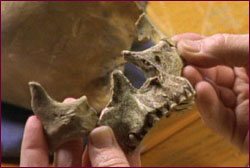
|

|
D. Gentry Steele Department of Anthropology, Texas A&M University I strongly believe in the importance and value of the scientific examination of our earliest prehistoric ancestors. Today's study of humanity's natural history has clearly documented the recency of human conquest of the last of Earth's landmasses. While we can trace our human lineage more than two million years back in time, the colonization of the New World, and the islands of the Pacific Rim—the last chapters in our global dispersal—are relatively much more recent events, having occurred within the last several thousand years in the case of the Pacific islands. The actions of these last pioneers were inexorably interwoven with and dependent upon those who went before, and because of this, are an integrated part of our life history. When and how the last of the Earth's landmasses were occupied, by whom, and how the processes of biological change marked humanity's last global pioneers are questions of interest to all. I also strongly believe that understanding our shared life history will ultimately help us appreciate our commonality.
Verifying our analyses is the foundation upon which all science is built. Without verification, the analyses are suspect at best, and at worst, ignored. This process of verification does not imply a lack of confidence in the work of the initial scholars. Rather, it is recognition that scientists gather and interpret scientific evidence within the context of a particular theoretical framework and perspective. Verification of a scientist's studies provides assurance that data supportive of alternative interpretations are gathered. Without this verification, scientific analysis is incomplete. Does Race Exist? | Meet Kennewick Man Claims for the Remains | The Dating Game | Resources Transcript | Site Map | Mystery of the First Americans Home Editor's Picks | Previous Sites | Join Us/E-mail | TV/Web Schedule About NOVA | Teachers | Site Map | Shop | Jobs | Search | To print PBS Online | NOVA Online | WGBH © | Updated November 2000 |
 Gentry Steele
Gentry Steele
 Without scientific investigation of early remains
such as Kennewick Man (part of whose skull is shown
above), we would have no knowledge of our prehistory,
Steele maintains.
Without scientific investigation of early remains
such as Kennewick Man (part of whose skull is shown
above), we would have no knowledge of our prehistory,
Steele maintains.